Fatima Whitbread: The abandoned baby who became javelin world champion
- Published

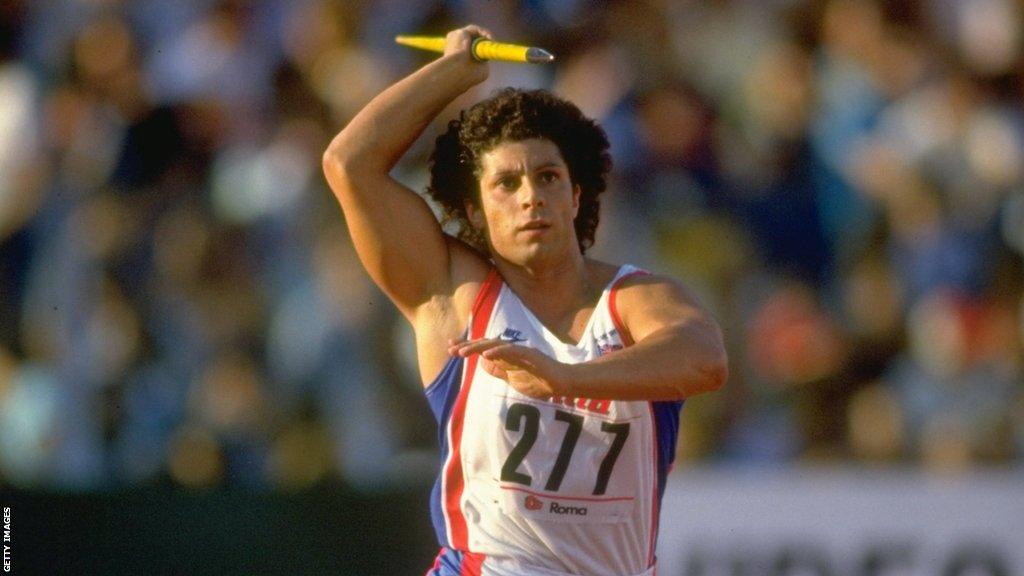
Fatima Whitbread spent the first 14 years of her life in children's homes and went on to break the javelin world record and win world and European Championship gold
This article contains references to rape and child abuse. If you have been affected by any of the issues raised, visit BBC Action Line.
In 1961, in a council flat in north London, a baby was crying.
Day after day, night after night, those cries, though weakening, did not stop.
Eventually, having seen nobody come or go from that flat, or heard any attempts to soothe the infant, a neighbour called the police. Inside, a three-month-old child was found alone; hungry, dirty, and desperately ill.
"I was abandoned, some would say left to die," says Fatima Whitbread.
You may know Whitbread as the javelin thrower - an Olympic medallist, world champion and former world record holder.
You may know her as the reality show contestant - the 'I'm A Celebrity, Get Me Out Of Here' camp-mate who got a cockroach stuck up her nose, or the 'SAS Who Dares Wins' recruit who powered through with cracked ribs.
On Tuesday, at Sports Personality of the Year 2023, she was honoured with the Helen Rollason Award for outstanding achievement in the face of adversity.
Because however you know Whitbread, her story is so much more.

28 August 1986 was not the sort of day the organisers had imagined or hoped for.
The weather over the Neckarstadion in Stuttgart was unseasonably damp and dreary, and the stands were half empty as javelin qualifying began at the European Championships.
Sixty-two metres was the standard to reach the next day's final. Whitbread's aim was to get the job done on her first throw and save energy for those that mattered.
Grainy footage shows her holding the javelin aloft with her right hand. Wearing her white GB vest and shorts, number 310 on her bib, she rocks back and forth, taking off on her left foot to thunder down the runway.
Eleven strides later, her legs a blur of motion, she lets go. She would later write in her autobiography that the javelin was "exploding like a missile" from her grasp.
From the moment she released her grip, Whitbread knew it was good. As it continued to float, it got better and better. She punched the air as it landed.
"I think that championship record has gone," said the television commentator. It had, and so too had the world record.
Whitbread had thrown 77.44m, beating the previous best by a huge 2.04m.
With it, she had become the first woman to throw more than 250 feet - a mark no-one thought possible - and the first Briton - male or female - to hold a world record in a throwing event.
The very next day, despite an injured shoulder that threatened to spoil the party, Whitbread won gold for her first major title, finessing her victory with the second-longest throw in history.
In a daze of happiness, she wiggled her hips in celebration. Her moment had finally arrived.
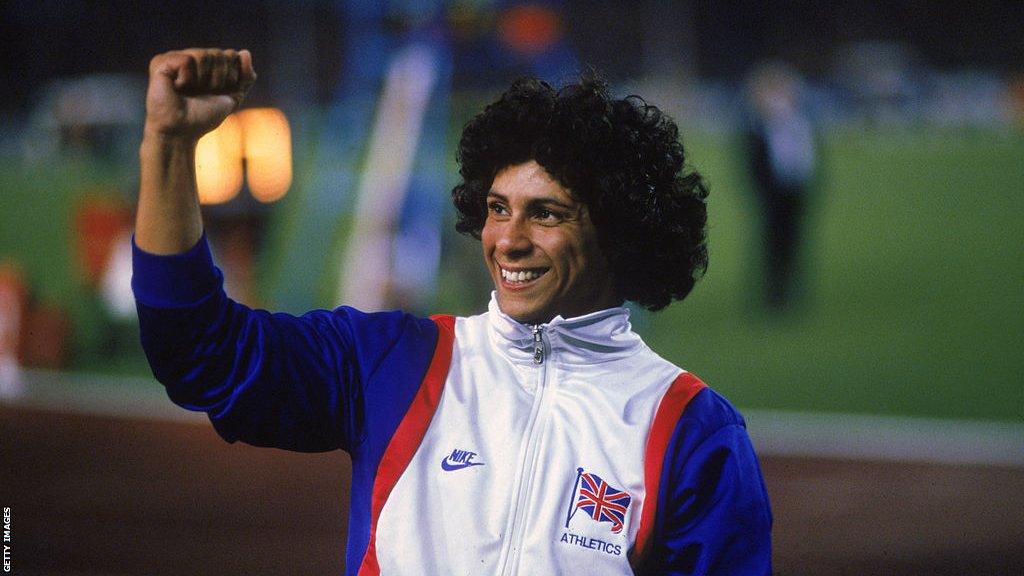
Fatima Whitbread celebrates her European Championship gold in 1986
A childhood 'sea of emotion'
A baby Whitbread spent months in hospital after the police took the call and steps to rescue her from that London flat. When she was discharged, the court system took responsibility for her young life and Whitbread's next 14 years were spent in care - "an awful long time to be institutionalised".
"For me, it was a sea of emotion and constant feeling of abandonment, attachment issues, emotional trauma," Whitbread, now 62, tells BBC Sport.
"I didn't know if I had a mummy or daddy, or anyone that came and visited us at special times of birthdays or Christmas. No messages, no cards.
"I can remember playing in the front room in the children's home. It faced the car park, and everybody that came to the car park that was coming to the home, I would always say: 'Is that my mummy coming to collect me?'"
When Whitbread was about five years old, it was. Whitbread's mother - who was Turkish-Cypriot - came to collect her, but only to take her to a new children's home where her half-brother and sister were living. Until then, Whitbread knew nothing of the existence of her biological parents, never mind siblings.
"When she arrived she never once made eye contact with me," she says. "I remember crying all the way down, because it was a very frightening thing to do to leave a home which had been there, which was your family."
The new children's home, in Essex, was devoid of any love and affection, and short of food and clothing supplies. The children played on a cold, dirty garage floor, banished to the porch step if they misbehaved, denigrated if they wet the bed.
From time to time, Whitbread's mother arrived to take her half-siblings out for the day, or to her home, but Whitbread was mostly left behind. On only one occasion was she taken too, only for her mother to change her mind and order Whitbread to walk back to the children's home alone.
As time passed, her biological father - who was Greek-Cypriot - was traced. Whitbread spent a promising week with him, though he never returned to the home to see her again.
"In order to protect myself, I put up walls of security around me," she says. "I would always protect myself from from being allowed to be loved or liked in any way, shape, or form."
There was, however, one "bright shining star" in her life. A lady known as Mrs Peat - or 'Auntie Rae' - worked at the children's home, and showered Whitbread with the love and affection she so desperately craved.
It was Auntie Rae who stopped Whitbread from leaving the home when her mother turned up again, this time with three men, wanting to take her to London for the weekend. She feared the men wanted to use her for prostitution.
Those fears were realised when, as an 11-year-old, Whitbread was told by a social worker that, against her wishes, she would be spending time during the summer holidays with her mother. Whitbread was repeatedly beaten and, on one night, was raped by a man staying in her mother's flat.
After escaping back to the children's home, Whitbread confided in Auntie Rae, who reported the abuse to the home's owners. Whitbread says she later learned there was no official inquiry, nor any mention of it on her case notes.

Sport was Whitbread's "saviour" - the only thing, as she wrote, "stopping me from drowning in despair". At school, she was a troublemaker, yet was picked for every sports team.
She captained the netball team. At one match, Whitbread remembers, as ever, she "made a lot of noise" in "motivating" her team-mates and disagreeing with the umpire's calls. By her own admission, she was a "pain in the backside".
"[The umpire] blew a whistle and said 'any of that young lady and you'll be off'," Whitbread recalls.
Some time later, down at Blackshots Athletics Stadium with a friend from another children's home, Whitbread noticed a javelin lying on the ground.
Wanting a go, she was told to wait for the javelin coach to arrive. When she did, Whitbread "did a double take".
"It's that same woman on the netball court who threatened to throw me off," she thought. From then on, Margaret Whitbread - a former Great Britain thrower who competed at the Commonwealth Games - taught the 13-year-old all she needed to know about the sport.
"I could see she was a very neglected young girl," Margaret tells BBC Sport. Later learning she was in a home, Margaret provided her with boots and a javelin to call her own.
When that javelin was accidentally thrown through the window of the children's home, Fatima was grounded for a month but managed to sneak a note to Margaret.
"Sorry, I can't come to the track," she wrote. "I smashed the French windows. But one day, I'd like to be the best javelin thrower in the world."
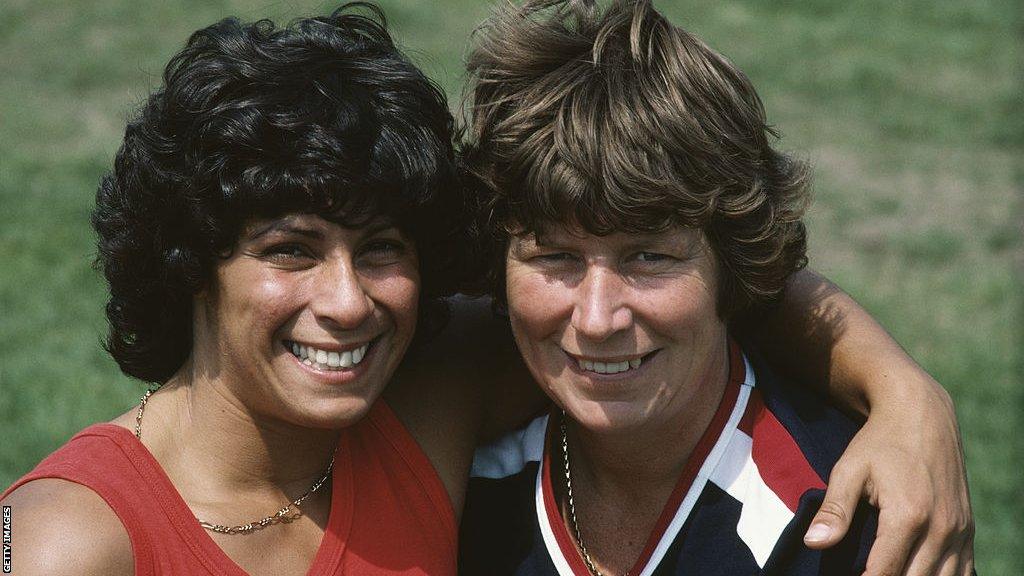
Fatima and Margaret Whitbread, pictured in 1977
Over time, Margaret would introduce Fatima to her husband, John, and sons Gregg and Kirk. She slotted into their life like she belonged there - the natural big sister to the boys.
"She completed the family unit," says Margaret.
"Do we have to take Fatima back to the shop?" asked Gregg, one evening. It was that night that the Whitbreads asked if she would like to join their family. The process was far from smooth, her biological mother refusing an adoption unless she was paid a handsome sum the family could not afford.
Fatima was ultimately fostered by Margaret and her family. She would later change her surname from Vedad - that of her biological mother - to Whitbread by deed poll to mark her new life.
At 14, she finally had a family, and a future.
"Mum and I, as mum and daughter, coach and athlete, ended up conquering the world."
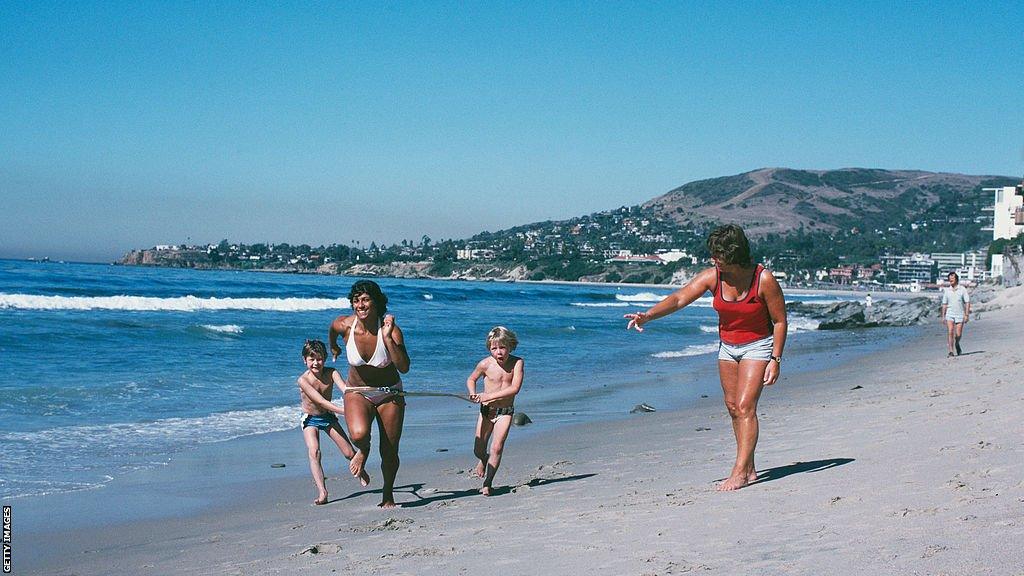
Fatima's athletics career was a family affair for the Whitbreads
'I had to write my life story before I was ready'
By 1986, Whitbread had already been to two Olympics - winning bronze in 1984 - and won World Championship silver. Her near-decade-long, often bitter, rivalry with fellow Briton Tessa Sanderson was in full swing.
Sanderson complained that Whitbread received greater promotion and was favoured by athletics' authorities at her expense. Margaret was a Great Britain javelin coach. Andy Norman, a family friend of the Whitbreads - and later Fatima's husband, was a promotions officer and well-connected agent in the sport at the time.
By the start of the 1986, Sanderson was considered the more reliable championship performer. She had won gold at the 1984 Olympics in Los Angeles and the 1978 Commonwealth Games.
Whitbread was consistent, but the most precious metal on the biggest stages had eluded her. At the 1986 Commonwealth Games in Edinburgh, staged just a month before the European Championships in Stuttgart, that trend continued.
Whitbread broke the Games record in her first three throws, but was pipped to gold as Sanderson found a little extra distance when it mattered most.
For some half an hour, Whitbread sat on the field in tears. "Twelve years of hard work. Still no [gold] medal," she reportedly said. "I've waited two long years. And now I'm humiliated."
The wait for that first major gold didn't last much longer, though. Merely a month later came that world record and European gold, success that spurred Whitbread to even greater heights.
Despite extensive injuries that threatened even her participation, Whitbread won world gold on a blistering hot day in Rome the following year - Britain's only title of the championships.
She wrapped up the year by being made an MBE, and crowned BBC Sports Personality of the Year - 12 months after finishing runner-up to Formula 1 driver Nigel Mansell.
"If you'd have asked me at 11 years old, would I have been able to predict an athletic career like that? I could not have seen it," Whitbread says.
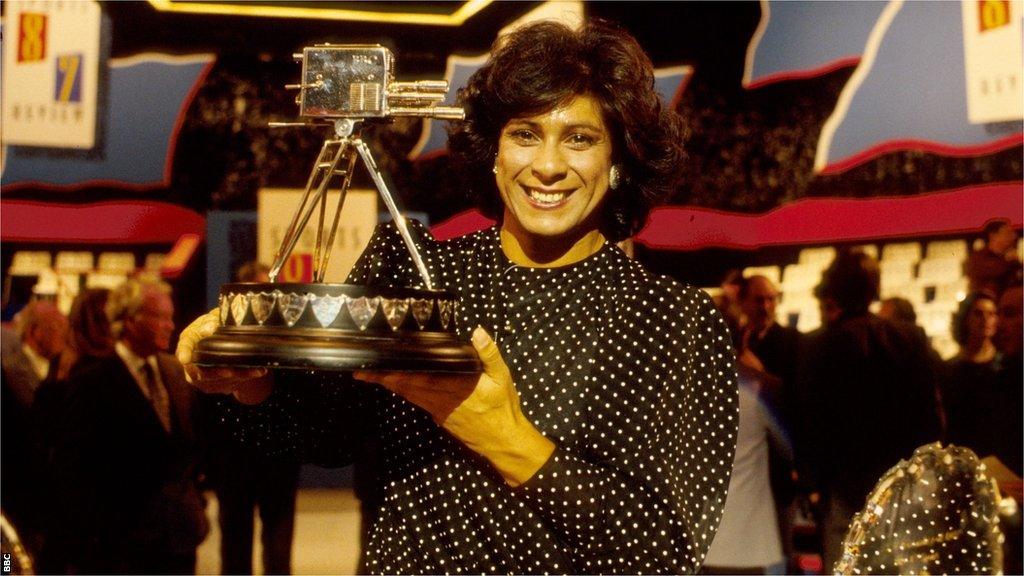
Whitbread was the 1987 BBC Sports Personality of the Year
But would 1988, an Olympic year, be even greater?
Perhaps it could have been but injuries hadn't been the only thing Whitbread had to contend with prior to winning her world gold in Italy's capital in 1987.
In the build-up, a national newspaper had tracked down her biological mother who, in a two-page interview, said she wanted Whitbread back in her life and her family.
At the start of 1988, while suffering with glandular fever, Whitbread was advised to write her first autobiography to tell her side of the tale.
Despite going on to win silver at the Olympics in Seoul, the challenges she was facing away from sport would eventually swamp her.
"I had to write my own life story before I was ready," she says. "I think just watching that cine film go past brought me to a breakdown."
"She did have a nervous breakdown, with all the stress she was under," says Margaret. "It was difficult to watch her battling with it. No matter what I said, or what other people said, you couldn't bring her out of it.
"It was a leftover from when she had been in care, suddenly she felt vulnerable."
Coupled with a rotator cuff injury, it ended Whitbread's career. "I was never able to get back from that," she says.
Finding a new calling
Whitbread's final competition was in 1990, weeks shy of her 29th birthday. After retirement, she remained in athletics - working in marketing as well as coaching all over the world.
Having tried for many years and having experienced a miscarriage, Whitbread and Norman welcomed a son, Ryan, in 1998 after a third round of IVF.
"Having my son was the greatest moment of my life," she says. "Being a mum came naturally to me."
She wanted to "break the mould" of her early experiences of motherhood as a child herself.
"It's why she's a brilliant mum, because she understands what a child needs," Ryan tells BBC Sport.
She could not protect Ryan from everything, though. Norman, who had split from Whitbread nearly three years earlier, died in 2007, when their son was just nine. Despite their estrangement, Whitbread and Norman had remained close, but his death brought with it huge debts.
Selling the family home and spells on reality TV - most famously her third-place finish in the Australian jungle in 2011 - kept Whitbread afloat.
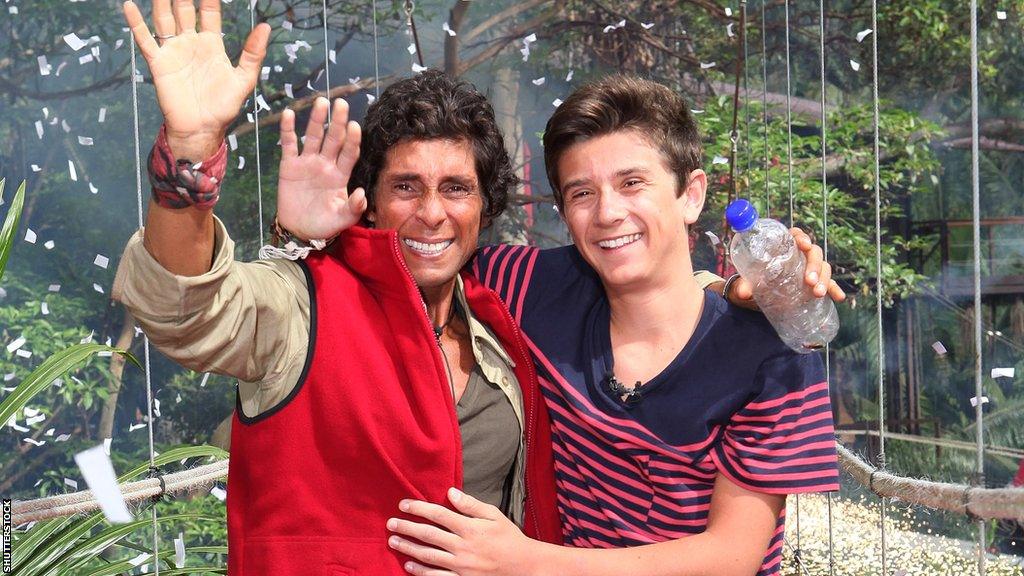
Whitbread (pictured with her son Ryan) was a camp-mate on 'I'm A Celebrity, Get Me Out Of Here' in 2011
Now, in 2023, she pours her energy into using her platform to help others, advocating for and creating awareness of children in the care system in order to give them "a voice so they can be seen, heard and valued".
According to charity Action for Children, there are more than 108,000 currently in care across the UK. As a result of the increased recognition of the scale of abuse taking place in such institutions during the late 20th century, large residential homes like the ones Whitbread spent her childhood in are now a thing of the past.
Today, most children's homes offer no more than six places but, in the latest figures collected at the end of March, 83,840 children are in care in England alone - more than ever before.
"I believe in these children," she says. "We should give them hope that they're seen, heard and valued."
As a child herself, Whitbread says she "didn't have any real expectations" of herself but now, through her own campaigning, wants "fundamental change" that will lead to children in care having "a safer, happier, healthier future", allowing them to reach their full potential.
"Would I change my past?" asks Whitbread. "I'd say no, because I believe my ministry now is to help these young children.
"My lived experience has given me the knowledge and understanding of what's needed. Change is coming."
"My mum's story is about a child born into nothing, who triumphed despite all the odds imaginable," says Ryan.
"She never gives up. She always sees the light at the end of the tunnel. She puts her mind to something, and she will succeed.
"Her will to succeed has been born from her will to survive."